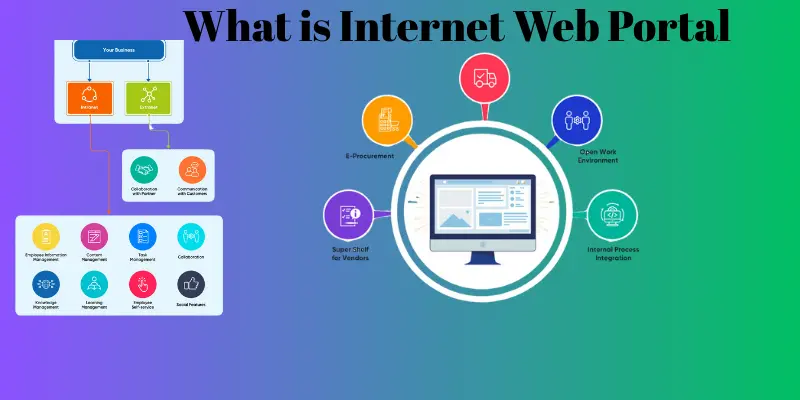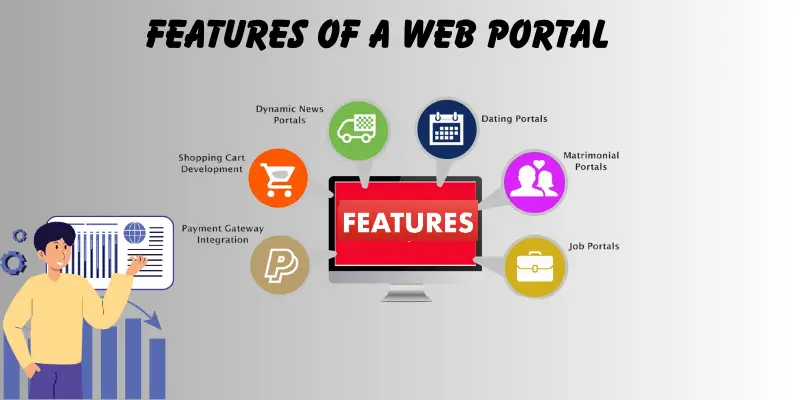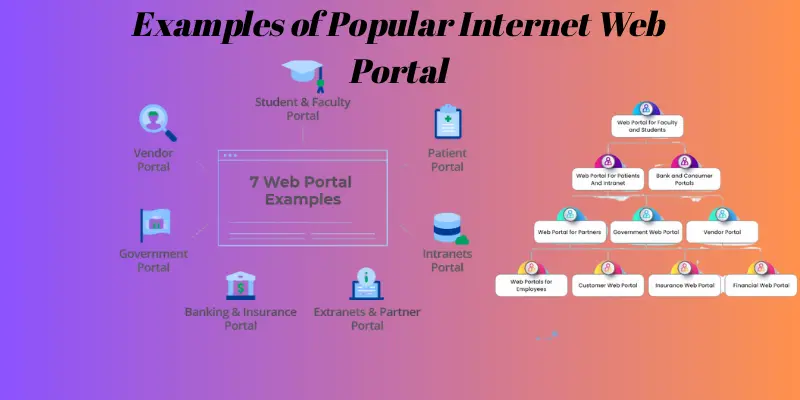Internet Web Portal – Types, Features and Benefits Explained
Published: 02/04/2025
Internet Web Portal, A web portal is a special kind of website that collects information from different sources and shows it in one place. It helps users find important information quickly without searching many websites. A portal site provides access to news, emails, online tools, and other services.
Many internet portal sites are used for business, education, and personal needs. Websites like Yahoo, Google, and MSN started as web portals, offering a homepage portal with different sections like news, weather, and email. Today, online portals help businesses manage data, customers, and employees in one system.
A website portal is different from a regular website because it is designed to organize and provide personalized content. Users can log in to access private information, such as bank accounts, online courses, or company reports. Internet portals are important for making information easy to use and improving communication.
Table of Contents
What is Internet Web Portal?
An Internet Web Portal is a special website that collects information from different places and shows it in one simple view. It helps users find useful content without visiting many websites. A web portal can have news, emails, messages, and other important tools in one place.

A portal website is different from a normal website because it provides personalized content. Users can log in to see their own data, like bank details, school results, or company reports. Many businesses and schools use online portals to share information with employees and students.
Examples of internet portals include Yahoo, Google, and MSN, which provide news, search tools, and other services. These web portals make it easy for people to get information quickly and in an organized way.
Types of Web Portals
Web portals come in different types, each designed for a specific purpose. Below are the main types of web portals used today:
- Horizontal Web Portals
- These portals provide a wide range of information on different topics. They are open for all users and offer services like news, emails, and search tools. Examples include Yahoo, Google, and MSN.
- Vertical Web Portals
- Also known as vortals, these portals focus on a specific industry or topic. For example, a medical web portal provides health-related information, while an education portal offers study materials.
- Enterprise Web Portals
- These portals are used by businesses and companies to share information with employees and customers. They help manage work, store data, and improve communication within an organization.
- Personal Web Portals
- A personal web portal allows users to customize their homepage with news, weather updates, emails, and favorite websites. It helps users organize information based on their interests.
- Online Information Portals
- These portals provide access to digital content like articles, videos, and documents. Examples include Wikipedia and online learning portals, where users can find educational materials and research data.
Each type of internet portal is designed to make information easy to access and manage. Businesses, schools, and individuals use web portals every day to save time and stay informed.
Features of a Web Portal
A web portal has many useful features that help users find information easily. Below are some important features of a portal website:

- Centralized Information
- A web portal collects data from different sources and shows it in one place. This makes it easy for users to access important content without visiting multiple websites.
- User Authentication
- Many internet portals require users to log in to access personal information. This keeps data safe and ensures that only authorized users can see private content.
- Customization Options
- A homepage portal allows users to personalize their experience. They can choose what information they want to see, such as news, weather, or emails.
- Search Functionality
- A good portal website includes a search bar to help users find specific information quickly. This makes navigation easy and saves time.
- Integration with Other Services
- A web portal connects with other online services like emails, calendars, and social media platforms. This allows users to manage everything from one dashboard.
- Secure and Private Access
- Many online portals provide a safe way to store and access sensitive data. Businesses, schools, and banks use internet portal sites to protect user information.
These features make web portals useful for education, businesses, and personal use. A well-designed website portal improves user experience and makes information easy to manage.
How Internet Web Portal Work?
A web portal works by collecting information from different sources and showing it in one place. It helps users find what they need quickly without searching many websites.
1. User Login and Authentication
- Most internet portals require users to log in using a username and password. This ensures that only authorized people can access personal information.
2. Data Collection and Organization
- A portal website gathers information from different websites, databases, and online tools. It organizes this data in a way that makes it easy to read and use.
3. Customization for Users
- Many web portals allow users to customize their homepage by selecting news, emails, or updates they want to see. This makes the portal site more useful for each person.
4. Search and Navigation
- A web portal has a search bar that helps users find specific information quickly. It also has menus and links to make navigation simple.
5. Integration with Other Services
- A website portal can connect with emails, social media, and cloud storage. This allows users to manage different online activities from one place.
6. Secure Data Sharing
- Businesses, schools, and banks use internet portal sites to share important data safely. These portals protect user information with encryption and security settings.
By combining all these features, a web portal makes it easy for users to access information, communicate, and complete tasks online.
Examples of Popular Internet Web Portal
Many web portals are used around the world for different purposes. Some provide news and search tools, while others help with business, education, and entertainment. Here are some well-known internet portal sites:

- Google
- Google is one of the most popular web portals. It offers a search engine, emails (Gmail), cloud storage (Google Drive), and many other services.
- Yahoo
- Yahoo is a portal website that provides news, emails, sports updates, and financial reports. It was one of the first internet portals to offer multiple services in one place.
- MSN (Microsoft Network)
- MSN is a homepage portal that gives users access to news, weather updates, and Microsoft services like Outlook and OneDrive.
- Wikipedia
- Wikipedia is an online information portal that provides free knowledge on almost every topic. It is used by students, teachers, and researchers worldwide.
- Amazon
- Amazon is an e-commerce web portal where people can buy and sell products online. It also offers cloud services and digital content.
- Facebook
- Facebook is a community web portal that connects people worldwide. It allows users to share posts, chat, and join groups based on their interests.
These web portals help users find information, communicate, shop, and stay updated with the latest news. They are an important part of the internet and make online tasks easier.
Advantages and Disadvantages of Internet Web Portal
Web portals offer many benefits, but there are also some drawbacks. Let’s take a look at the advantages and disadvantages of using a portal website.
Benefits of Internet Web Portal
A web portal makes online tasks easy by providing quick access to information, emails, news, and services in one place. It saves time and keeps data organized.
| Pros |
|---|
|
Drawbacks of Internet Web Portal
Web portals have some issues like security risks, slow loading, too much information, internet dependency, and privacy concerns that can affect user experience.
| Cons |
|---|
|
Common FAQs about Internet Web Portal
Here are some common questions people often ask about web portals:
A web portal is a website that brings together information from different places and shows it in one easy-to-use location. It can include news, emails, search tools, and more.
Some popular web portals are Google, Yahoo, MSN, and Wikipedia. These websites offer many services like searching, emails, news, and information all in one place.
To access a web portal, you usually need to visit the website and log in with a username and password. Some portals let you create a personalized homepage to see what matters most to you.
Yes, most web portals are safe to use, but it is important to use strong passwords and be careful when sharing personal information. Always make sure the portal has good security to protect your data.
Yes, many web portals allow you to customize the homepage. You can choose what information, like news, weather, and emails, you want to see first when you log in.
The benefits of using a web portal include easy access to information, a personalized experience, and the ability to connect with many online services all in one place.
A website usually provides information on one topic or subject, while a web portal gives you access to many different services and information in one place.
Some web portals let you use their basic features without logging in, but many require you to create an account to access personal information or extra services.
Conclusion
A web portal is a useful tool that makes it easy for users to find information, communicate, and access services all in one place. Whether for personal use, business, or education, web portals help organize online tasks and make them more convenient.
By offering features like customization, secure access, and the ability to connect with other services, web portals provide many benefits. However, it’s important to stay aware of the disadvantages, such as security risks and possible information overload.
Web portals play an important role in today’s internet world by making online experiences more efficient and organized.

- Be Respectful
- Stay Relevant
- Stay Positive
- True Feedback
- Encourage Discussion
- Avoid Spamming
- No Fake News
- Don't Copy-Paste
- No Personal Attacks

- Be Respectful
- Stay Relevant
- Stay Positive
- True Feedback
- Encourage Discussion
- Avoid Spamming
- No Fake News
- Don't Copy-Paste
- No Personal Attacks





